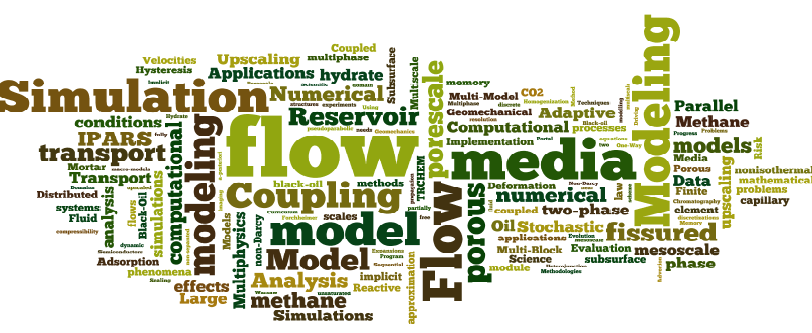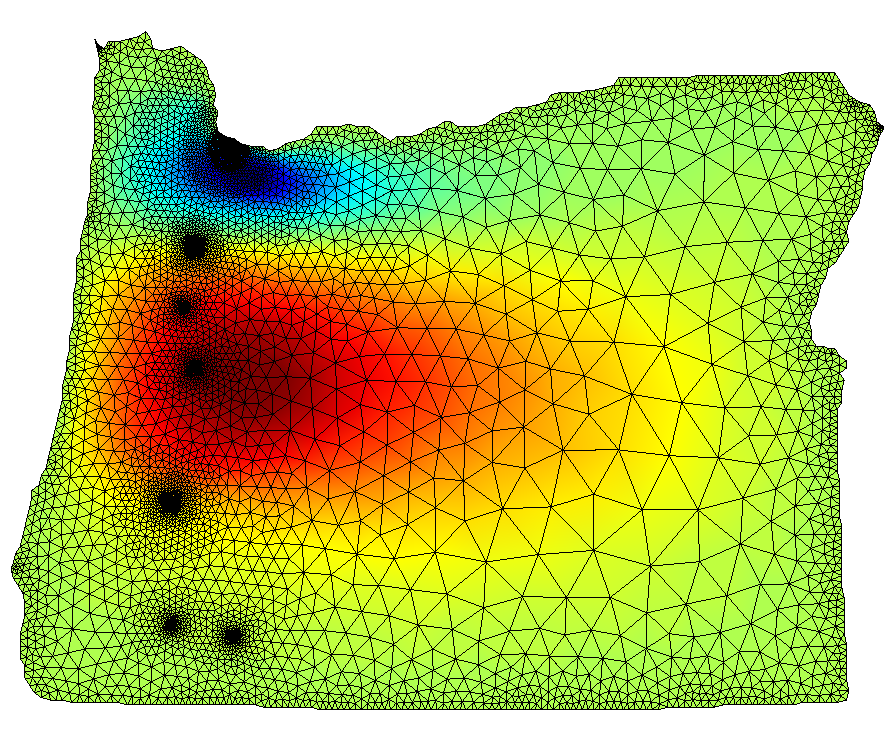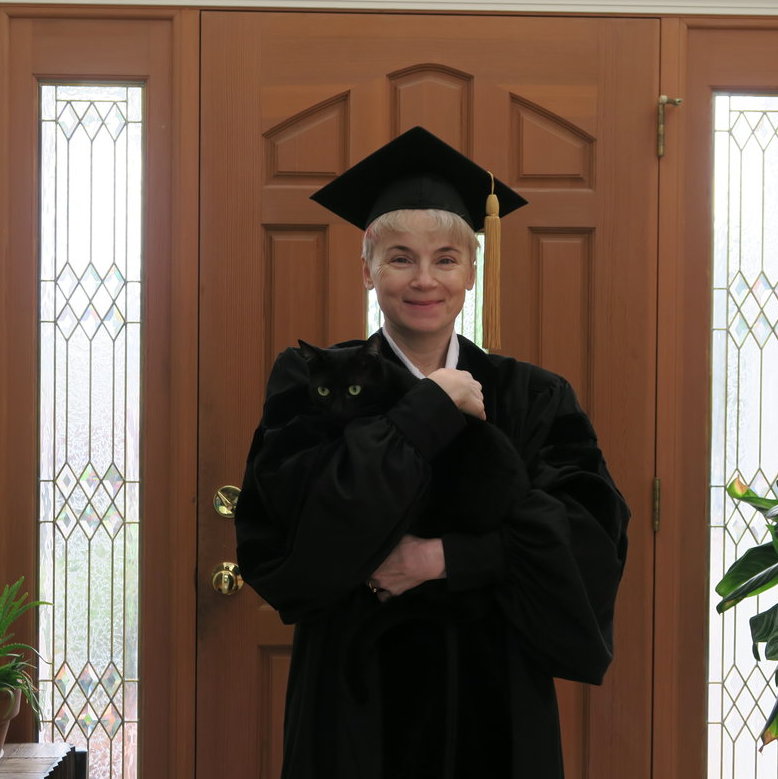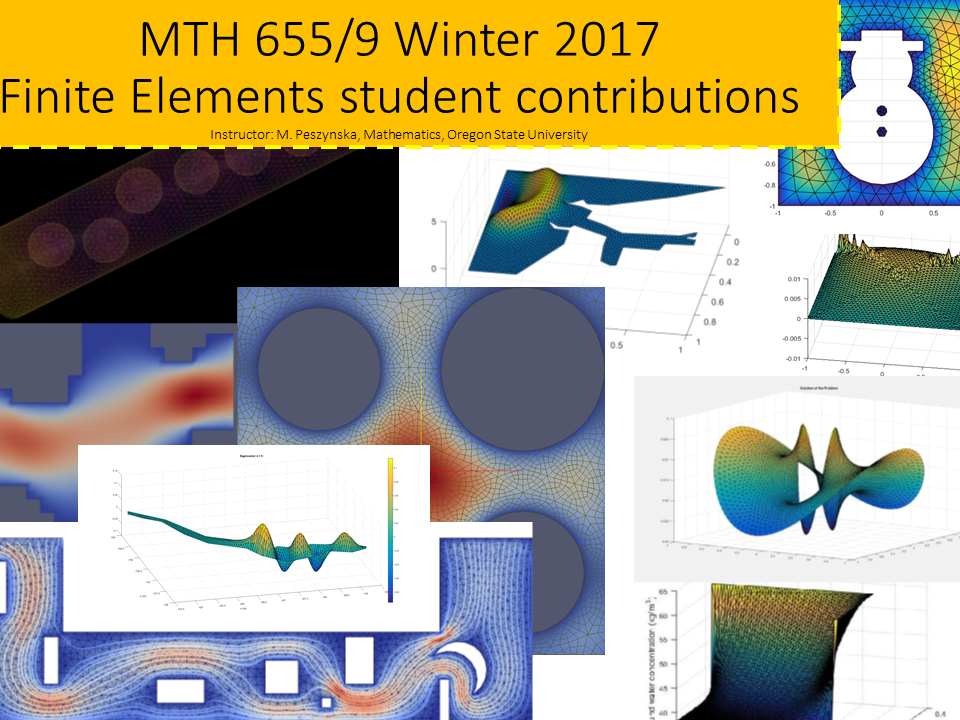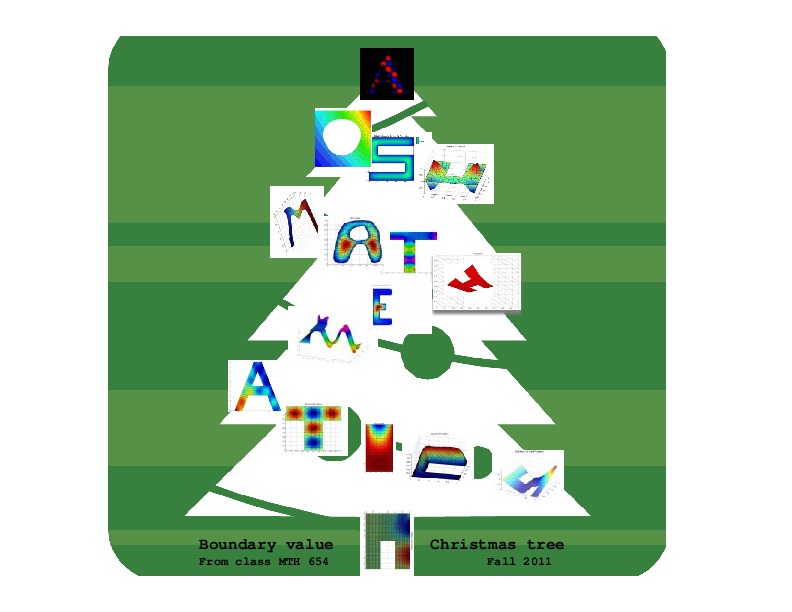CLASSES
Below you can find links to upcoming, current, and past classes I taught since 2003. More.... in my CV.
Upcoming and current classes
- Spring 2026: MTH 42-520
- Spring 2026: MTH 622: Partial Differential Equations, part 2
- Winter 2026: MTH 621: MTH 622: Partial Differential Equations, part 1
- Fall 2025: MTH 654/9 Numerical Analysis: Analysis and Approximation of Flow PDEs.
- Fall 2025: MTH 4/581: Applied Ordinary Differential Equations.
- Spring 2025: MTH 4/553 Numerical Methods for PDEs.
- Winter 2025: MTH 4/552 Numerical Methods for ODEs.
- Fall 2024: MTH 654/9 Numerical Analysis: Solving Nonlinear Coupled PDEs.
- Fall 2024: MTH 4/581: Applied Ordinary Differential Equations.
Past classes:
- Spring 2024: MTH 4/553 Numerical PDEs.
- Winter 2024: MTH 4/552 Numerical Methods for ODEs.
- Fall 2023: MTH 4/551 Numerical Linear Algebra.
- Fall 2023: MTH 654/9 Numerical Analysis: Finite Elements .
- Fall 2022:MTH 627 Advanced PDEs.
- Fall 2022: MTH 654/9 Numerical Analysis: Computational mathematics foundations for multiphysics .
- Spring 2022:MTH 623 Partial Differential Equations.
- Winter 2022:MTH 622 Partial Differential Equations.
- Fall 2021: MTH 654/9: FINITE ELEMENT METHODS.
- Fall 2021:MTH 621 Partial Differential Equations.
- Spring 2019: MTH 420-520: MODELS AND METHODS OF APPLIED MATHEMATICS
- Winter 2019: MTH 655-9: Large Scale Scientific Computing with Data
- Winter-Spring 2018-19: MTH 507. Introduction to Mathematics Profession
- Winter-Spring 2018: MTH 599. Introduction to Mathematics Profession
- Spring 2018: Numerical PDEs 453 553
- Winter 2018: Numerical ODEs 452/ 552
-
Fall 2017: Numerical Linear Algebra MTH
451/
551
- Winter-Spring 2017: MTH 599. Introduction to Mathematics Profession
- Winter 2017: MTH 655/MTH 659 on Finite Elements
- Spring 2016: MTH 623 Differential and Integral Equations of Mathematical Physics
- Spring 2016: MTH 420-520 Models and Methods of Applied Mathematics
- Winter-Spring 2016: MTH 599. Introduction to Mathematics Profession
- Winter 2016: MTH 655/9. Numerical Functional Analysis with Applications
- Winter 2016: MTH 622. Differential and Integral Equations of Mathematical Physics
- Winter 2016: MTH 699 (umbrella class for Extreme Scaling Course)
- Fall 2015: MTH 621. Differential and Integral Equations of Mathematical Physics
- Fall 2015: MTH 311.
Advanced Calculus
- Spring 2015: Models and Methods of Applied Mathematics 420/ 520
- Winter 2015: Applied Partial Differential Equations 482/ 582
- Fall 2014: Numerical Linear Algebra MTH 451/ 551
-
Fall 2014: Mathematical Methods for Engineers and Scientists
481/
581
- DOE NETL grant buyout S'2014
-
Spring 2014: Models and Methods of Applied Mathematics (MMAM),
see Draft of announcement
(Do not hesitate to contact me with questions).
NEW: The class has just been approved by OSU Curriculum Council and will be offered as MTH 420/520 starting in 2014-15.
- Winter 2014: MTH 480 Systems of ODEs
- MTH 654-659 Finite Element Method for PDEs
-
MTH 355
Discrete Mathematics
Check Fibonacci spirals (link courtesy of students in MTH 355).
- Spring 2013: MTH 453-553 (Numerical Solution of Partial Differential Equations)
- Winter 2013: MTH 452-552 (Numerical Solution of Ordinary Differential Equations)
- Winter 2013: MTH 655/9 (Numerical Analysis: Large Scale Scientific Computing)
- Winter 2013: MTH 312 (Advanced Calculus II)
-
Fall 2012: MTH 311
(Advanced Calculus I)
- Spring 2012: MTH 623 (Differential and Integral Equations of Mathematical Physics)
- Winter 2012: MTH 622 (Differential and Integral Equations of Mathematical Physics)
- Winter 2012: MTH 254 (Vector Calculus)
- Fall 2011: MTH 654/659 (Finite Element Methods)
-
Fall 2011: MTH 621
(Differential and Integral Equations of Mathematical Physics)
- Winter 2011: MTH 655/659 (Numerical Functional Analysis with Applications)
- Winter 2011: MTH 351 (Introduction to Numerical Analysis)
- Winter 2011: MTH 254 (Vector Calculus)
- OSU FTR F'2010
- Fall 2009: MTH 654/659 (Numerical Analysis) Large scale scientific computing methods
- sabbatical leave F09-S10
- DOE grant buyout S'2009
- Fall 2009: MTH 621 Differential and Integral Equations of Mathematical Physics
- Winter 2009: MTH 622 Differential and Integral Equations of Mathematical Physics
- Spring 2009: MTH 623 Differential and Integral Equations of Mathematical Physics
- Fall
2008: MTH 341 Linear Algebra
- Spring 2008: MTH 453-553 Numerical Solution of Partial Differential Equations
- Winter 2008: MTH 655-Numerical Analysis: Finite Element Methods for Partial Differential Equations
- Winter 2008: MTH 452-552 Numerical Solution of Ordinary Differential Equations
- Fall 2007: MTH 551 Numerical Linear Algebra
- Fall 2007: MTH 254
Vector Calculus
- DOE grant buyout S'2007
- Winter 2007: MTH 655/659 (Numerical Analysis) Large scale scientific computing methods
- Winter 2007: MTH 312-Advanced Calculus I
- Fall 2006: MTH 311-Advanced Calculus I
-
Fall 2006:
MTH 256H-Applied Differential Equations
- Spring 2006: MTH 351-Introduction to Numerical Analysis.
- Winter 2006: MTH 256-Applied Differential Equations
- Winter 2006: MTH 655-Numerical Analysis: Finite Element Methods for Partial Differential Equations
- Fall 2005: MTH 351-Introduction to Numerical Analysis.
- OSU FTR F'2005
- Spring 2005: MTH 453-553 Numerical Solution of Partial Differential Equations
- Winter 2005: MTH 452-552 Numerical Solution of Ordinary Differential Equations
- Winter 2005: MTH 254: Vector Calculus
- Fall 2004: MTH 451-551 Numerical Linear Algebra
- OSU FTR F'2004
- Spring 2004: MTH 659- Topics in Numerical Analysis: "Introduction to Mathematical Aspects of Finite Elements"
- Spring 2004: MTH 351-Introduction to Numerical Analysis.
- Winter 2004: MTH 312-Advanced Calculus II
- Winter 2004: MTH 351-Introduction to Numerical Analysis
- Fall 2003: MTH 311-Advanced Calculus I
